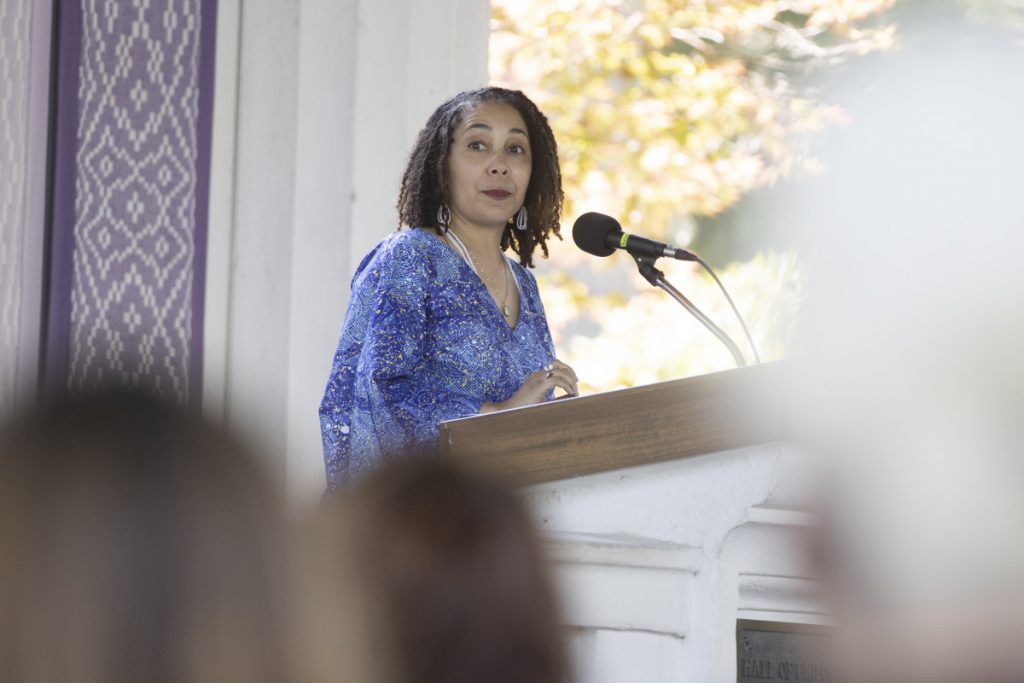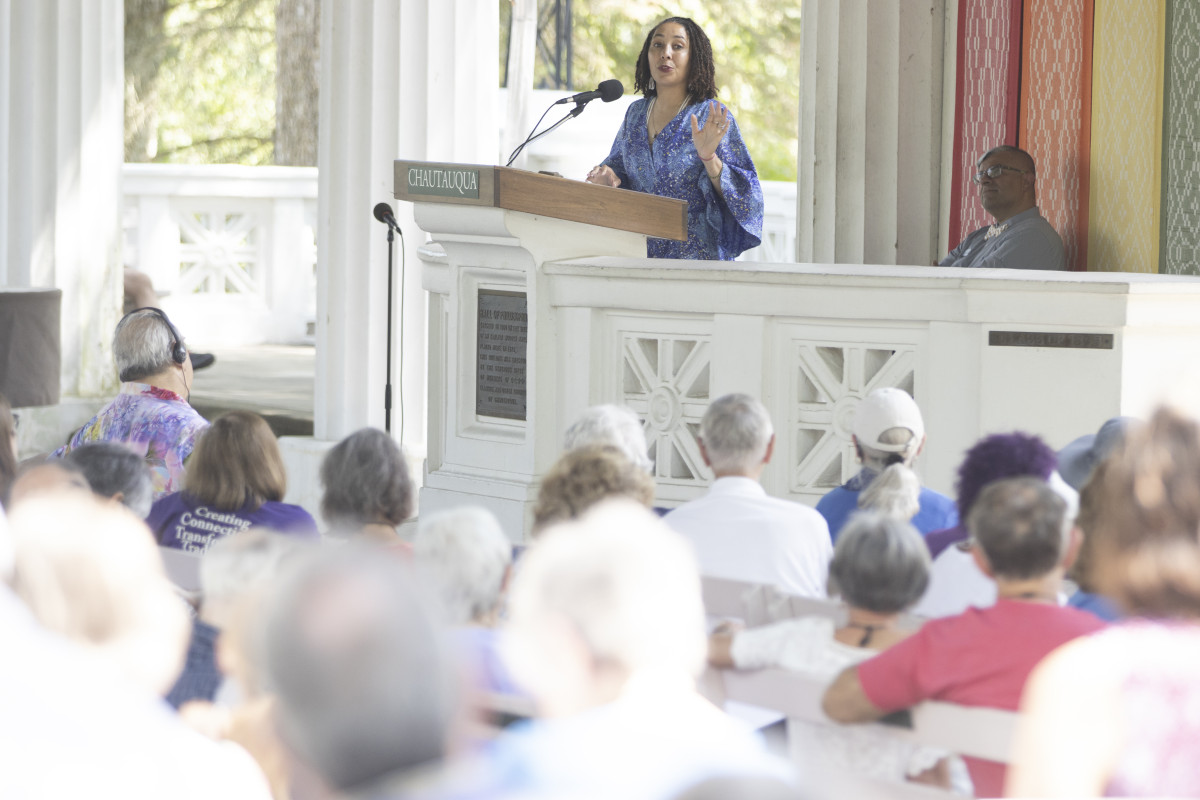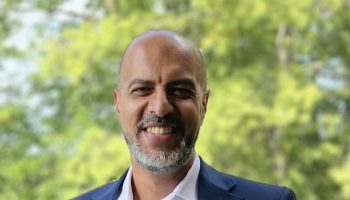American society often places a fulgent spotlight on achieving success, but Monica Coleman argued people must be taught how to navigate the darkness of loss.
Coleman, award-winning scholar, ordained minister and professor of Africana Studies at the University of Delaware, delivered her lecture, “Learning to Lose,” on Wednesday, Aug. 3 in the Hall of Philosophy. Continuing Week Six’s Interfaith Lecture Series theme of “Embracing the Dark: Fertile Soul Time,” Coleman spoke candidly on her own struggles with mental health and faith.
“I’m a person who lives with a depressive condition. So I know a lot about loss,” Coleman said. “To me, (loss is) what depression feels like.”
Despite people’s best efforts, failure and loss inevitably enter the lives of everyone in some way, shape or form, she said.

“Losing isn’t sexy. It’s not something you want. We don’t want to work on how to be better losers,” Coleman said. “But that’s what I’m going to talk about: how to lose and how to be better at losing. Not because losing is the goal, but because loss is inevitable. We can’t dodge it, evade it, ignore it or avoid it.”
With a plan to provide Chautauquans with tools to dig themselves out of the rut of loss, Coleman shared three lessons in losing.
To embrace these difficult experiences and develop bravery in the midst of despair, Coleman said she would discuss “how to lose your mind, how to lose your life and how to lose your faith.”
Children are taught to prepare for emergencies at school in the form of fire drills, lockdowns and sheltering-in-place. Coleman grew up in the Midwest, so she also participated in tornado drills and learned the tell-tale warning signs.
“I knew if we had a hot day and a cold day back to back, that was tornado weather. … I knew the shade of green the sky turns (when) there’s a twister nearby,” Coleman said. “I knew what to do when (tornadoes) happen because I was prepared for an emergency.”
Other crises could be prevented or mitigated with similar means of preparation. Those with preexisting mental health issues are often encouraged to create an emergency plan, she said.
These emergency plans frequently include steps one would take to secure their safety when they do not feel safe with themselves; identifying a few trustworthy friends or family members is a typical requirement of these plans, Coleman said.
“I didn’t like the idea of putting my faith in someone else,” she said. “More honestly, I was afraid of how bad off I was going to have to be if that’s what I needed to do.”
But around 20 years ago, Coleman was having a particularly difficult time, and needed to use her emergency plan. She was able to call a friend who was both a therapist and a pastor.
After asking Coleman how she was feeling, if she wanted to hurt herself and if she wanted to be alive, her friend concluded it was time for Coleman to receive professional help.
“Now, I heard her, but I felt a lot of conflict about this, because in my mind, we were now at the line between me and crazy,” Coleman said, “between me and really going off the deep end.”
She felt a cloud of shame form above her head; she knew how much stigma mental health issues carried.
One of Coleman’s work colleagues had a bipolar depressive condition, and Coleman heard her other coworkers talk about it in a way that showed they took the colleague less seriously.
So, the morning following her talk with her trusted friend, Coleman drove 90 miles away to go to a hospital outside of her community, ensuring her privacy. She also wanted to go to a research center in hopes the doctors would be able to better manage and understand what she called a complex diagnosis.
Coleman found herself able to relax in the secure environment of the hospital. She was able to settle down and focus purely on her mental health.
“I was afraid of losing my mind, and once I got past this fear, I got a retreat,” Coleman said. “I got somebody who would take care of the things that I couldn’t do, so I could begin to focus on what was challenging.”
If Coleman hadn’t used her emergency plan, this story could have ended very differently.
“Being hospitalized prompted me to take my condition seriously, because I hadn’t taken it seriously enough,” she said. “… So I would say the most important lesson to learn about losing your mind is that you should find someone you can trust when you can’t trust yourself. Because life is more important than being afraid of losing your mind.”
Along with her depressive condition, Coleman lives with another debilitating issue. Her kneecaps naturally dislocate due to a hereditary disease.
Coleman learned more about this condition and realized her kneecap would dislocate every time she walked, but it didn’t hurt because they were accustomed to that pattern.
“But when it dislocates outside of that rhythm, it hurts a lot,” Coleman said. “There’s certain things that put more pressure on my knees and make them dislocate. And there’s certain activities that help to strengthen (those) muscles.”
Some environments and situations can trigger a mental breakdown, while other practices can help to strengthen one’s ability to cope with these stressors, Coleman said. Physical conditions can be similarly impacted by different stressors.
Coleman once dislocated her knee in a way she had never dislocated it before. She was in severe pain, and needed to see an orthopedic surgeon. The doctor told her that she must rest her knee by using crutches, and expressed how important it was for Coleman to use the crutches for two months after her knee felt better.
The support of crutches can help heal an injured knee, while medication for mental health differences can provide relief to debilitating symptoms. Although neither support system would cure Coleman’s knee or her depression, they would significantly help her to function.
Even though using crutches meant that Coleman needed to change her lifestyle and lose mobility, this experience wasn’t a loss. The same can be said of her stay in the mental hospital.
“If you’re willing to rest in order to heal your mind, you can do things you didn’t know you could do,” Coleman said. “You can do more than you could have done before, or you can do something new.”
Speaking on the loss of faith, Coleman, like many others, has questioned her faith after enduring difficult and unjust circumstances.
“I’m very public about the fact that I’m a survivor of sexual violence. In the immediate aftermath of that experience, I lost my faith,” she said. “Before then, I had the faith of the kind of God … that will swoop in and fix your life if you pray and ask for it. And I prayed for it and asked for it, and it didn’t happen.”
At this time of deep questioning, darkness and loss of faith, Coleman was in her master’s of divinity program, and had to complete an internship.
“I had to do a field education requirement that required me to go be ministerial,” Coleman said. “I had to go help somebody else with their faith when I was losing mine.”
But Coleman learned that faith would find her again if she just showed up to her internship.
She eventually found the calling to help others heal through collaborating with the pastor of the church where she was interning. Together, they started a church ministry that evolved into a nonprofit organization called The Dinah Project, which was an organized church response to sexual violence crisis in the community.
“We had mental health professionals working with social workers, working with clergy. We had worship services,” Coleman said. “We talked about rape from the pulpit. We talked about what it might mean to heal from sexual violence, and how we might wrestle with our faith in the midst of that.”
With these journeys, Coleman has learned to accept loss and work through it to get to the other side.
“We should do a better job of teaching us how to lose because we do lose. … We won’t always win,” she said. “But more importantly, most of us are stymied by the fear of loss. We’re afraid to lose our minds, afraid to lose parts of our lives … afraid to lose our faith. But when you let go of that fear, I think we’ll find much more courage.”





